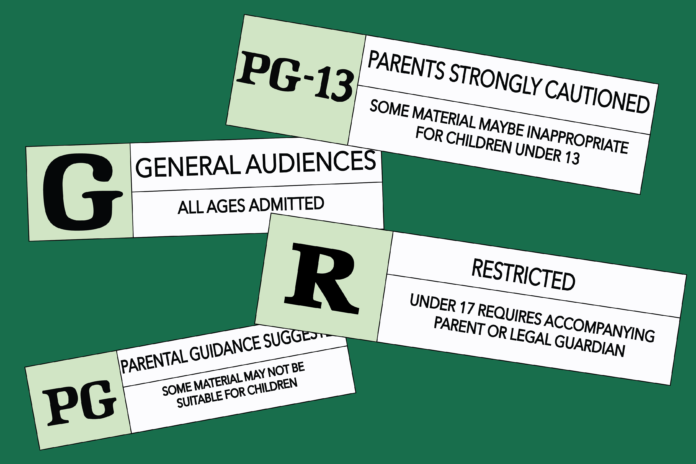The system is highly subjective and outdated
There is a scene in the movie “Cinema Paradiso” where the town priest reviews every single film to see if anything needs to be cut before it plays at the theater. This includes kiss scenes, sex scenes and everything in between. He just rings his bell at any hint of raunchiness, and the projectionist then promptly snips the scene out.
Although our current rating system is thankfully far from that, it still evokes the same problematic subjectivity.
The Motion Picture Association of America (MPAA) was first established in 1922 and shouldered the task of censoring Hollywood productions, rather than being left to the government. Later, the Hays Code was adopted to set guidelines for film producers in the hope that, “If motion pictures present stories that will affect lives for the better, they can become the most powerful force for the improvement of mankind.”
Essentially, films had to abide by three rules: Not lower the moral standard of the audience, improve the standard of life and not violate any form of law or sympathize with those who do.
In 1968, this changed to the rating system we all know and love today: General Audiences to NC-17. That being said, it has been 52 years since the MPAA has last properly revised its rating system, and, at this point, it’s simply outdated.
Perhaps what is most useless about the rating system is the ambiguity in how it is all decided. In Kirby Dick’s documentary “This Film is Not Yet Rated,” he reveals that the MPAA does not disclose any information regarding their rating decisions nor do they tell filmmakers which scenes need to be cut out or edited to change that result.
The members of the Classification and Rating Administration (CARA), who determine ratings, consist of average American parents with children ages five to 17, with the expectation that they will be rotated out every five years. Dick’s documentary revealed this not to be true, with parents overstaying their time on the board, having children over 17 and failing to keep up with our changing culture.
At least two members are required to be representatives of the Catholic and Protestant Church. The expectation that two religions, out of the plethora of religions that are practiced in the United States, are to intercede in the decision process is absurd. Unfortunately, the earlier image of a priest ringing a bell at sex scenes is not that different from our contemporary rating system.
The MPAA also places a disproportionate emphasis on sex over violence. While films that contain genuinely violent and heavy themes often receive R ratings, scenes with sex and profane language are rated NC-17.
“They’re too easy on violence yet bizarrely reactionary when it comes to nudity and language,” notes film critic Michael Phillips.
There is also a strong bias against films with LGBTQ+ themes. The film, “Love is Strange,” which centers around a homosexual couple, is rated R, despite its lack of nudity or violence. Meanwhile, Tarantino’s gore-heavy “Kill Bill” shares the same rating — posing the question of what truly makes a film “adult.”
The new film-adaptation of “Hamilton,” which is set to be released next fall, has also gone through censorship. By redacting profane language, creator Lin Manuel Miranda hopes to open the musical to wider audiences.
“I don’t think we’re depriving anyone of anything if we mute an f-bomb here or there to make our rating,” Miranda said.
Although the musical already deals with themes of adultery, the language seems to be a more pressing matter in embodying Disney’s movie standards of PG-13 or lower.
As a fan of “Hamilton,” I was disappointed upon hearing this news. After seeing the musical live myself, I can attest that the f-word is the icing on the cake for many of the lyrics.
“It’s time for more people to condemn the MPAA and their outrageous antics,” said David Chen, the managing editor of Slash Film. “We’re heading towards an age when we don’t need a mommy-like organization to dictate what our delicate sensibilities can and can’t be exposed to. I deeply hope that the MPAA’s irrelevance is imminent.”
The rating system’s problem lies in its overt subjectivity. Violence, sex and language have various levels of extremes and therefore cannot be consolidated into a single rating. Especially with religion involved, the MPAA will never be objective in their decisions.
The MPAA may be useful in avoiding awkwardly watching sex scenes with your parents or from shielding kids from gruesome material, but at the end of the day, it deters filmmakers from creating fully-realized art.
If an f-bomb is needed to really sell a line of dialogue, let it. Films shouldn’t have to change for the sake of appeasing theater-viewing standards. In a society already exposed to such themes in the news and outside our homes, I can assure you that these elements are not all that surprising.
Written by: Julietta Bisharyan — jsbisharyan@ucdavis.edu
Disclaimer: The views and opinions expressed by individual columnists belong to the columnists alone and do not necessarily indicate the views and opinions held by The California Aggie









